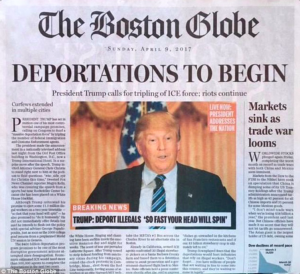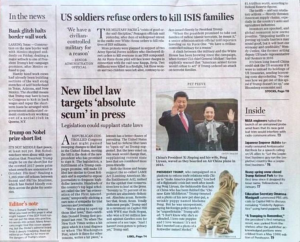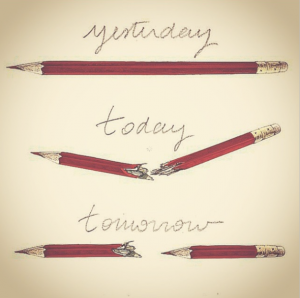The Boston Globe’s satirical front page warning of life under a Trump presidency, published in their opinion section on April Fool’s Day
This morning the Boston Globe shared a brilliant piece of satire in their opinion section: a mock-up of what their paper would be like one year from today if Donald Trump were to win the presidency. Predictably, social media is blowing up with explosions of outrage from people who don’t know the particulars or the place of opinion pieces in journalism and have no awareness of the importance and history of satire in affecting political change. They say they are appalled and offended and that the Boston Globe has lost all credibility. Let us pause to consider some important truths.
The mocked-up pages of the newspaper did not take over the front of the newspaper. Those who go to the Boston Globe will find the satire in the opinion section, the same section in which other political positions are taken every single day in thousands of newspapers and news sites across the nation and around the world in the form of editorials, op-ed pieces and political cartoons.
For those who cry “Outrage!” that the Globe would stoop so low as to share a political opinion in the form of satire, I ask them: does your favorite news source publish opinion pieces? Have you never seen a political cartoon? Do you not read infographics which selectively choose which facts to highlight every day? These tools have been used to sway popular opinion and have been integral pieces of journalism for hundreds of years. Newspapers and journals have always taken stands; very few of them do not endorse candidates for president. The best of them present their opinion pieces in the clearly labeled opinion section; they do their best to report the facts with little adornment throughout the rest of the paper and then put the opinions of their editorial board and columnists in a section expressly labeled as a place where people take sides and try to persuade. The Boston Globe did exactly this with their publication of their “Donald Trump’s world” satire.
Confused and misinformed modern readers often erroneously believe that it is the job of the media to be completely without bias at all times. Ironically, this idea is most often promulgated by followers of extreme-right news media whose every pronouncement has conservative political overtones. There is not a middle ground to every question, and the correct journalistic response to opposing views is often to refuse to sit squarely in the middle and pretend that there is no right or wrong answer when facts point clearly to one side over the other. In many situations, there is a clear and fundamental truth at stake, and not just a matter of opinion. Vaccines do not cause autism, for example, and sweeping worldwide climate change is real. Reporting on such issues as if they were controversial and unanswerable questions would be to mislead readers into thinking that established facts are mere opinions.
When trained journalists turn their well-informed and often cynical eyes on a world full of opposing opinions, murky details and obvious facts, it is their job to not only gather and separate facts from misstatements but also to ask questions about where those facts will lead us. It is their job to think of the likely consequences of a world in which each of the presidential candidates went on to be elected and then ran their administration according to their stated beliefs. Usually they do this in words or cartoons. In a world in which newspapers are quickly dying for lack of readership and most people gather the bulk of their news from online sources, the most effective way to get attention for their opinions is now to take chunks of information and spread them via Facebook or Twitter or Instagram alongside punchy visuals.
Another page from the Boston Globe satire
By creating a stunning visual parody mini-newspaper as a warning of what could come, the Boston Globe knew that they would be able to get attention for their opinions and get people to consider consequences in a more visual, visceral and immediate fashion. They knew that they were taking an editorial risk, but that their message would be carried and discussed by thousands of news outlets and social media platforms around the world. They decided to present an editorial in visual form to get attention, yes, but they buttressed their opinions with facts, quotes and context in the way of a warning. This is their Orwellian admonishment to those who will not bother to read newspapers or consider facts anymore.
The job of any editorial board is to get attention and sway opinion by asking people to consider the consequences of their choices. Those who raise the alarm that the Boston Globe has now shown itself willing to trick people with fake news are the same people who haven’t bothered to actually look at the well-produced parody itself, nor to consider that they get much of their own information from avowedly conservative sources with axes to grind who are more than willing to publish opinion and pretend that it is fact.
As has happened throughout history, a large proportion of the population is bored by and tired of politics and won’t read the facts about the candidates’ actual stances on substantive issues. The average citizen of the U.S. only thinks of the candidates in broad, cartoonish terms without thinking through what the consequences of our electoral choices may be. People justify their political agnosticism and ennui by saying that all candidates are equally corrupt and evil and all of them will lead to the same bad outcomes, so their votes are meaningless and futile. This is demonstrably false.
Being a good citizen requires mental effort and a willingness to expend some time and expose one’s opinions to rigor. Lives and livelihoods depend on it. Rights are won and lost over such things. People starve or go without medicine or surgery because of politics. Wars begin and end, countries are invaded and people go to jail or are freed or executed based on the choices we make at the polls. The stakes are so incredibly high that those who spend their lives following politics obsessively and who report on these issues feel they have a duty to use every tool they have in order to get us to sit up and take notice when it’s time for us to make life-changing, world-altering decisions. The Boston Globe has done this using pointed and potent (and clearly labeled) satire. I applaud them for it.



